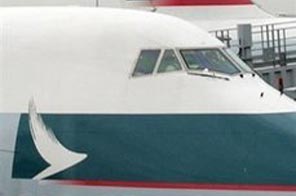Dismal first half for Cathay Pacific
HONG KONG: Hong Kong carrier Cathay Pacific said Wednesday the global economic crisis had battered its passenger and cargo services in the first half of the year, with revenue plummeting 27.1 percent.
A collapse in business and first class travel was accompanied by a similar plunge in the firm's cargo business, as demand from the United States and Europe for products made in southern China's factory belt disappeared.
Turnover fell to 30.92 billion Hong Kong dollars (3.96 billion US) in the first six months of the year from 42.39 billion in 2008 due to weak demand, the carrier said in a statement.
"The simple truth is that we continue to lose money due to the deep and sustained downturn in our passenger and cargo businesses," chairman Christopher Pratt told reporters.
Pratt said passenger revenue fell 23 percent in the first half compared to the same period in 2008 and that the cargo figures were "even more depressing", down almost 40 percent.
Despite the tumble, Cathay actually reported a profit of 812 million dollars for the first six months of 2009 as a result unrealised gains in fuel hedging contracts, compared to a loss of 760 million over the same period last year.
But Pratt said such apparently strong figures were misleading and that without fuel hedging and tax, Cathay actually made an operating loss of 765 million for the first six months of year.
He added that in recent weeks the downward trend for both passenger and cargo travel showed signs of stabilising, but such good news was very tentative.
"The best we can say at the moment is that the worst may now be over... But we still cannot see any clear sign of any sustained pick-up in our core business," Pratt said.
He added that the opening up of direct flights between Taiwan and mainland China in recent months, which previously had to go via Hong Kong, had also hit revenues.
The brutal figures follow the airline's 2008 net loss of 8.6 billion Hong Kong dollars -- a dramatic turnaround from the 2007's profit of 7.0 billion dollars -- on the back of huge fuel hedge losses and falling cargo business.
While the recent rising fuel price had minimised some of those hedging losses on paper, Pratt said the recent surge in the cost of oil raised further worries for the business.
The drop in demand and the realising of some of the hedging positions had seen the company's cash position worsen by 1.2 billion between the end of 2008 and the end of June, the chairman said.
Despite this weakening, Pratt said there were no current plans to go to the financial markets to raise funds.
Since the crisis began, the firm has taken six of its cargo planes out of service, Pratt said, and would now look to "park" six of its passenger planes before the end of the year.
The firm did not pay a first-half dividend.






